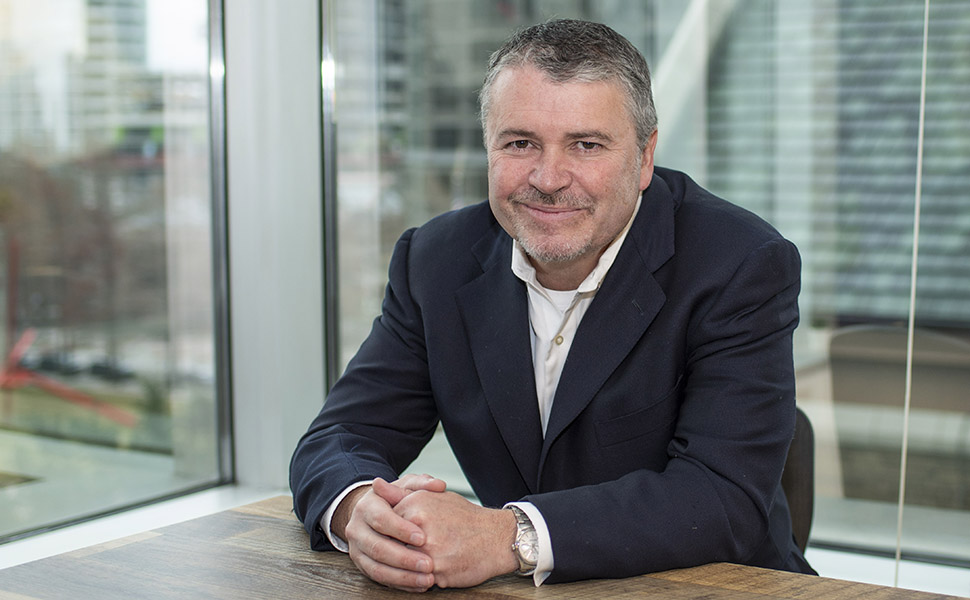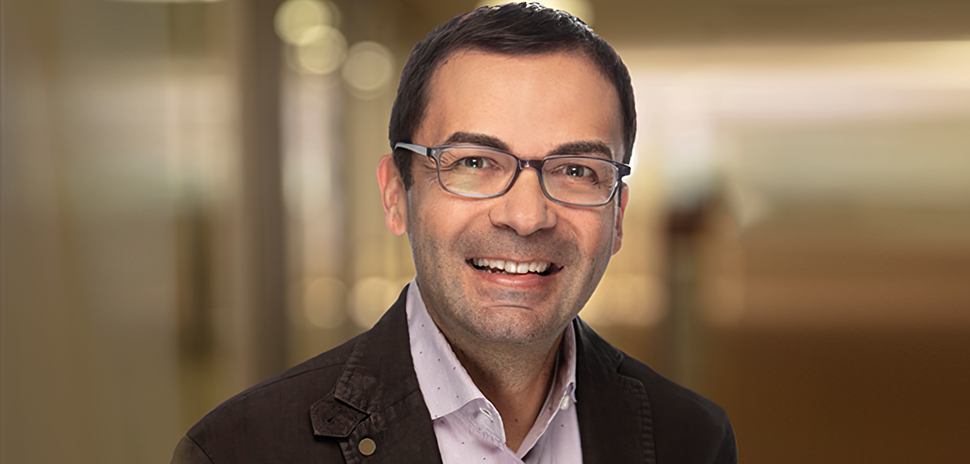After a 20-year run at GameStop and a stint leading Big Brothers Big Sisters, Bill Chinn is now making entrepreneurship his daily pursuit—and it’s a “dream come true.”
As the new(ish) CEO of The Dallas Entrepreneur Center, Chinn has been working on getting the strategy right, which he says is “capacity building,” so 2020 can get off to a fast start. He’s building on a currency of trust at The DEC, which was co-founded in 2013 as a nonprofit by Trey Bowles and Jennifer Conley.
And the most fundamental change is that Chinn wants to look and act more like a nonprofit, while enhancing the entrepreneurial community along the way.
“I’m never working in the private sector again. I really loved my time there, but I was very intentional from the day I graduated college: I was a nonprofit person,” he says. “The minute I could afford it, I became a nonprofit person, and I won’t go back.“
Now, about five months into his new role, Chinn has been working to familiarize himself with the entrepreneurial community.
He has experience in the arena, having taught at SMU and started or participated in several startups. He says opportunity is everywhere throughout the robust DEC Network, so now he has to grasp the question of where to start and where to end.
Chinn recently spoke with Dallas Innovates about his new job and the excitement surrounding Dallas Startup Week.
You took the reins about five months ago with no official fanfare, much like some of the entrepreneurs you work with who may operate in stealth. What have you been working on as you look to 2020?
We’re getting ready to build in 2020, and we need a platform. We have the board, but we need an audit committee and a governance committee. Without that, it’s difficult to track state dollars. We’re already doing it. But we can do it significantly better in 2020 with the right platform.
My lens is always about how we are supporting the community. We’re definitely leaning into our philanthropic side. Certainly we need to get sponsorships, and we need wonderful partners to afford those goals, but that’s not who we are. You should staff your board with people who are strategic, big picture, and think about the future. And then encourage them to refine and pick the right strategy for the organization will look like in five years. We haven’t answered that question for The DEC yet, but we certainly have the right people and the right materials to get there.
Alyce Alston, the former DEC CEO, was brilliant from a marketing standpoint, and we’re building off that. She got people excited about our mission.
Let’s talk about Dallas Startup Week, which will be at Gilley’s Dallas in 2020 from April 26-May 1.
Dallas Startup Week is the cornerstone of what we do, and this one is going to be amazing. We’re not making it bigger, we’re making it better. And we’ve really had a great start: Every sponsor came back from last year, which is an incredible indicator that people were pleased.
This is the first time we’ve had both the time and the capacity to plan like organizations that are used to running these huge events. It’s gotten so big we need to plan 18 months out. The most important change is moving to the one-site solution at Gilleys in 2020. People will stay longer and attend more events. I think we’ll see double-digit increases in the number of attendees.
From an organization standpoint it seems like you’re thinking in terms of verticals.
We’re really thinking about the user experience. We pored over the surveys, quantified them, and really tried to figure out what people wanted. We’re really lucky because we had participation—300 people responded to the survey from last year.
We’re in a great place this year with so much time to plan. We can start zero-based, see what our participants want, and build it right.
You’re also running The DEC Network, which is six innovation hubs across DFW that provide entrepreneurs with education, mentorship, and community. What’s next?
We’re a nonprofit, and there’s a lot of trust in our brand. We’re here to work with everyone. We’re here to boost the DFW entrepreneurial community. That’s our job.
We have a great partnership with Capital Factory (Editor’s note: Capital Factory and The DEC are co-located), and likely there will be more partnerships announced this year.
Our philanthropic side is really No. 1: It’s job creation in underdeveloped areas, and we’re going to continue on that path. The DEC is a network, and our locations include Red Bird, Addison, and UNT’s southern campus. And we’re hoping for a seventh one next year in southeast Fort Worth.
So your plans are to foster the startups who are going to hire people in those underdeveloped areas?
Absolutely. And attract capital to those areas.
Essentially the model is, we don’t want to be competitive with other [coworking spaces] that are doing a great job incubating entrepreneurs. Nonprofits should not be running a mission that’s already been covered by the private sector pretty competently. But, what we’re hearing is that there’s a need in underdeveloped areas of the city.
In these areas, a nonprofit can go there with essentially free rent. We can put entrepreneurs in one room where all the magic happens. We can provide content, certainly, but the real magic is when they learn from each other. And they have a sense of community.
In Red Bird and the UNT southern campus, there’s a sense of community where they’re really helping each other. Survey after survey says, “Why do entrepreneurs from that demographic not move forward and start that job creation process that we need so desperately?” It’s because of a lack of capital. The DEC can really facilitate that. We want angel and VC groups to take a look at the southern sector. That’s a place they don’t look currently, and they should. There are amazing deals down there right now. They are enterprise deals: they’re not as “techy,” but they can be very lucrative.
Not all startups are tech, right? There are a lot of startup businesses to be fostered.
Absolutely. If you’re going to sustain the economy with real job creation, you’ve got to follow with capital.
You’ve got to have places for entrepreneurs to go to. It’s a desert out there when it comes to incubating entrepreneurs. That’s something we can keep fulfilling.
There’s clearly pent up demand. In our Red Bird location, you’re on a wait list if you want an office. So we need to keep going. I think that the question that Trey [Bowles] asked a few years ago is: “Where are the entrepreneurs in the Southern sector?” And no one knew the answer.
No one knew if they were driving North, if they were in the spare room, or if they didn’t exist. It was a huge risk to open a 7,000 square foot center. But it paid off. People are paying rent, and these are not free offices. If we can go in at a low cost, if we can get all of this funded by the state, and have amazing banking partners, then we can continue to open and take risks that other people just can’t because of our nonprofit status.
Clearly, Dallas Startup Week and the Southern sector is a big push for The DEC.
Push is right—but it really is a pull. Because the community has really embraced us.
In Southern Dallas, they’ve made our life so easy. And it’s a pull from our financial partners, too. I mean, the state wants us down there, the city wants us down there, the banking industry wants us down there—all our partners are down there.
So it really is a pull. We’re answering the call to fill gaps in the southern sector. And now, Fort Worth has called us and said, “We want to be part of that.” They offered us two spaces in southeast Fort Worth.
The way you talk about the region makes us think of it as a giant Innovation Lab. How can we unleash it?
Dallas will continue to be a market leader with all the Fortune 500 companies here—and coming here. Entrepreneurs need that kind of market to sell into. We’ve got it all, and Texas is strong for business. There’s a Texas Triangle, and we’re the tip of that.
This Q&A was edited for brevity and clarity. A version originally ran in Dallas Innovates 2020: The Magazine.
Read it online
Dallas Innovates 2020: The Magazine highlights Dallas-Fort Worth as a hub for innovation. Our third annual print publication declares “The Future is Here.” It’s a moment for innovation in Dallas-Fort Worth, one that we’ve been working toward for a long time.
![]()
Get on the list.
Dallas Innovates, every day.
Sign up to keep your eye on what’s new and next in Dallas-Fort Worth, every day.




























